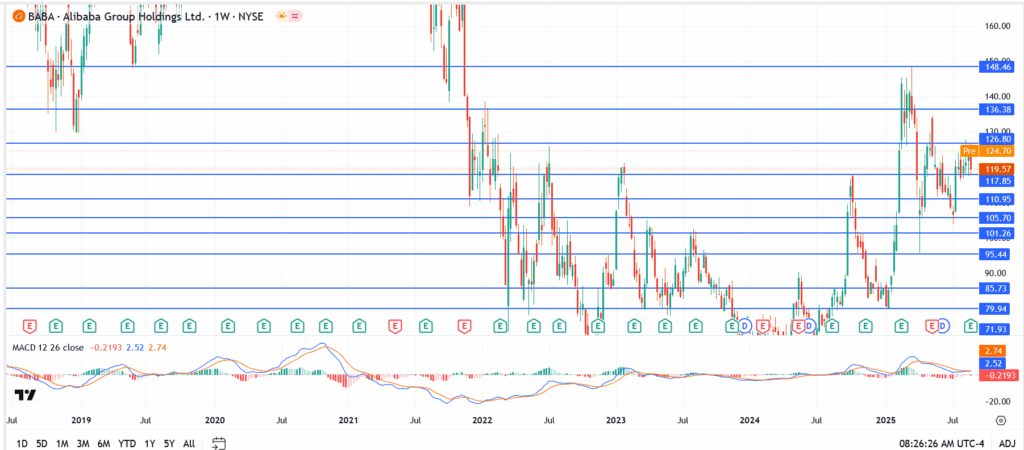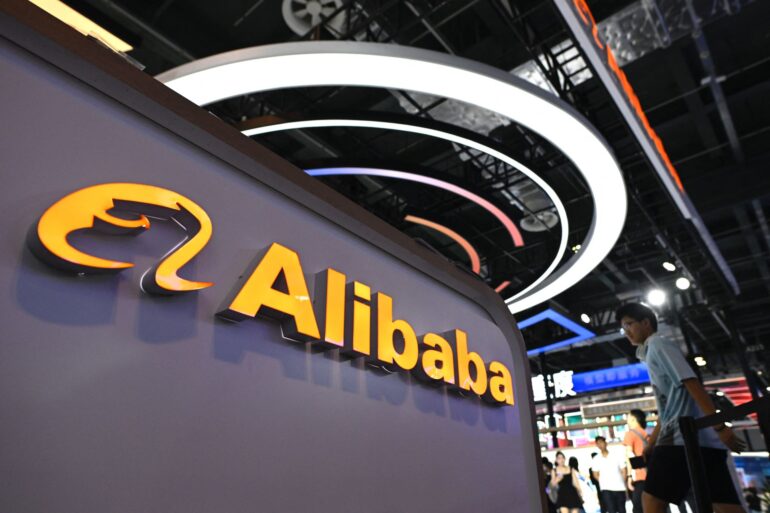- Alibaba shares dip after an earnings miss. New AI chip launch signals Beijing’s push to rival Nvidia and reshape the future of China’s tech.
Alibaba (NYSE: BABA) is sitting near $124.70 in pre-market Friday, a touch softer after earnings failed to impress Wall Street. The chart shows a stock that’s been grinding in a sideways channel, holding above $119 support but unable to clear the $126–127 resistance band that has capped every bounce this month. It’s a fragile setup, the weekly candles tell a story of recovery, yes, but with plenty of hesitation layered in.
Why Did Alibaba Stock Dip After Earnings?
The miss came down to the company’s bread and butter: e-commerce. Alibaba posted 247.65 billion yuan ($34.62 billion) in revenue for the June quarter, a shortfall against the 252.9 billion yuan analysts wanted to see. That gap may not look huge on paper, but the backdrop matters. China’s “food war” price cuts have ripped through margins, and investors hate seeing volume growth bought at the expense of profitability.
Cloud, the business unit that bulls keep pointing to as the next leg of growth, did show improvement, but it wasn’t enough to move the needle. Traders essentially shrugged, saying: the consumer slowdown is still here, the pricing pressure isn’t easing, and Alibaba’s moat in retail isn’t what it once was. That’s why the stock backed off, even though the headline numbers weren’t disastrous.
Alibaba Chart Analysis: Key Levels to Watch
- Support: $119.50, then $117.85
- Resistance: $126.80, then $136.40
- Medium-term line in the sand: $110.95
- MACD: rolling over slightly, hinting at cooling momentum

The technical picture says one thing clearly, Alibaba has to defend the $119 handle. If that level cracks, the next stop is closer to $111, where buyers last stepped in aggressively.
Can Alibaba Challenge Nvidia in China’s AI Chip Race?
Earnings aside, the bigger story may be Beijing’s push for AI. Alibaba, once one of Nvidia’s largest customers in China, is now rolling out its own chips to fill the gap left by U.S. export restrictions. Reports say its latest design offers bigger memory than Nvidia’s H20 chip, the only advanced model Washington allows into China, though it burns more power to get there.
It’s early days, and nobody’s saying Alibaba is about to dethrone Nvidia. But paired with rivals like MetaX, this shows how quickly Chinese tech giants are moving to reduce dependence on U.S. suppliers. For investors, that AI angle could eventually re-rate Alibaba’s cloud business, giving it optionality beyond retail.
Conclusion: What Should Investors Watch?
Here’s the balancing act: Alibaba’s earnings miss reinforces near-term caution, but the chip story adds a future-facing growth lever. If the company can keep e-commerce from bleeding margins while pushing its AI narrative forward, the stock has a shot at reclaiming the $136 zone. Fail to hold $119, though, and sentiment could sour quickly.
The market’s message right now? Alibaba’s story is no longer just about shopping carts. It’s about whether it can stay relevant in the AI arms race while keeping the cash registers ringing.
Alibaba’s cloud division has introduced a next-generation AI chip that some analysts see as a milestone for China’s domestic tech industry. The chip is being positioned as a practical alternative to Nvidia’s H20, offering higher memory capacity and competitive performance for specific AI workloads, though it does consume more power. Analysts argue this is a clear step in China’s long-term plan to reduce reliance on U.S. technology. Alibaba’s chip is more of a strategic breakthrough than a direct Nvidia replacement at this stage.
Alibaba has delivered a 40% rebound in 2025, helped by a rally in Chinese tech stocks and renewed interest in AI and cloud services. However, its long-term outlook depends on three key factors: China’s consumer recovery, the success of its AI strategy, and regulatory stability at home and abroad. For long-term investors, Alibaba remains a potential growth story, but the risks tied to margins and competition mean timing entries and exits is critical.


